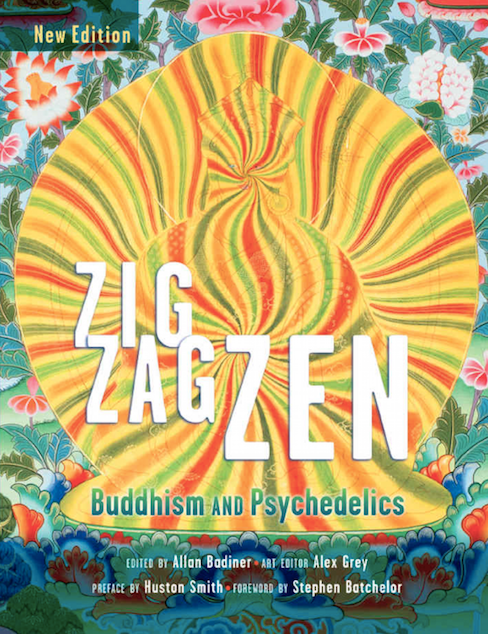The book Zig Zag Zen: Buddhism and Psychedelics is a compilation of articles and interviews written and conducted by several respected people in both the Buddhist and psychedelic communities. The pieces explore the crossovers between Buddhism and psychedelics and offer an honest perspective about whether psychedelic substances have a place in a sincere Buddhist practice, and vice-versa.
Following a foreword written by Stephen Batchelor, a preface written by religious studies scholar Huston Smith, and an introduction written by the book's editor Allan Badiner, Zig Zag Zen is broken into three main sections: "Intersection", which explores the points common to both topics, "Concrescence?", which discusses the coalescence or "growing together" of Buddhism and psychedelics, and "Lessons", which offers advice from the elders in both movements for a beginning psychonaut or Buddhist.
The "Intersection" section covers topics like the Tibetan Book of the Dead and a 1964 psychedelicized version of it called The Psychedelic Experience, the concept of suffering, America's relationship with Buddhism, shamanism, spiritually-influenced artwork, and other various spiritual practices. The authors featured in this section include psychedelic researcher Ralph Metzner, professor Roger Walsh, anthropologist/writer Christian Rätsch, and Allan Badiner, among others.
The "Concrescence?" section begins with a thorough explanation of Buddhist and psychedelic artwork by visionary artist Alex Grey, followed by an explanation by Rick Strassman concerning his groundbreaking DMT research, and then features several chapters on various topics such as "psychoactivism", "leaning into rawness", ayahuasca, cannabis as a harm reduction practice, and a fantastic analysis of psychedelics' potential role in Buddhist practice by writer Erik Davis.
The final section, "Lessons", includes several discussions concerning whether psychedelics are a help or a hindrance on the Buddhist path, features an interview with the well-known psychedelic bard Terence McKenna, the work of Rick Doblin with the Multidisciplinary Association for Psychedelic Studies (MAPS), Lama Surya Das' "zen commandments", and more.
The book is extremely well-written and edited, and offers an honest look at whether psychedelics can play a valid role in a Buddhist practice. The authors (and speakers) in the book do not all agree on a conclusion, and so it is up to the reader to decide whether psychedelics would truly assist them in their spiritual path or not. Featured throughout the book are a plethora of breathtaking art pieces in full color. I would advise this book to anyone who has an interest in either Buddhism or psychedelics.
5/5 stars. 240 pages.







